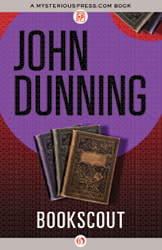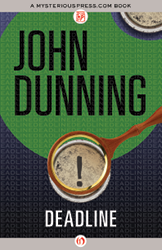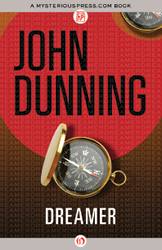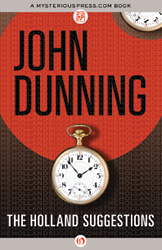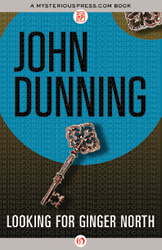Bookscout (3 page)
Authors: John Dunning

Their eyes met. “Two-fifty,” Ramsey said.
Joel took a deep breath.
“All right, Joel,” Ramsey said, “You know I don’t lie. I got somebody who’s just slobbering to find one of these. She’s been hounding me for three years to get her one. I’ll split with you fifty-fifty. Call it three and a quarter.”
Joel looked at the floor.
“Now come on, Joel, you’re not going to get near that anywhere else.”
“Oh, I know that. I’m not trying to pump you up, Mr. Ramsey. It’s just … Well, the book’s got meaning to me.”
“Sentiment, Joel? How’s that gonna pay the rent?”
“Y’see, it’s like this.” He struggled to find the words and finally settled on these: “I knew the author.”
Ramsey’s eyes narrowed. “You
knew
Walter Behr?”
This was not something he wanted to discuss. It was an uncomfortable part of his life, and Ramsey had a way of getting inside things. If he hadn’t been a book dealer, Ramsey might have made a good detective. In a way, the two businesses were much alike.
“How well did you know him, Joel?”
“Well enough, I guess.”
“What happened to ’him?”
“What’d ’ya mean what happened.”
“Joel,” Ramsey said patiently, “if you knew Walter Behr, you’ve got to know that the mystique about this particular book is based on a couple of things. Like (a), why did he change directions so radically after this, and (b), why did he write just three more books when he was obviously such a hot item? Not to mention (c), where did he disappear to and what became of him?”
They just stared at each other for a long moment.
“Joel?”
“Yeah, I heard you. Well, Mr. Ramsey, he changed directions to make money. He was damn sick of being poor.” Joel realized his voice was rising, and with it his temper. “He always felt he’d sold out with those next two books, and he once swore he’d never do that, see? Behr always believed whoring should be done in bed, not at the typewriter. That’s what kinda man he was, y’see. Then with that fourth book he tried to go back. Nobody liked it, not the critics, not the public, not a god damn reader in the whole United States of America liked that book.” He took a deep breath, then, softly, said. “Then he got sick of that too. He just got damn tired of the way the world was going. Got tired of writing. Starting thinking good writing was passe, you know what I mean?”
“Damn,” Ramsey shivered. “I just got the queerest feeling.”
“He was just tired of having to do it the way everybody else wanted it,” Joel said. “So he quit. Then he died.”
“Died,” Ramsey said. His eyes never left Joel’s face. “You’re telling me Walter Behr died. When was this, Joel?”
“Hell, I don’t know. Few years back.”
“Walter Behr died and nobody knew about it?”
“That’s how he wanted it.”
“Okay.” But Ramsey continued to scrutinize him. His eyes were relentless, digging through the topsoil of the soul. Without either of them saying anything more, something basic and elemental had changed between them; their relationship had shifted to another level.
“Well, then,” Ramsey said; “let’s talk about this.” He touched the book lovingly.
“I don’t know. I just don’t know.”
“It’s your decision, But I’d hate like hell to think of you carrying something like this around all weekend in a brown paper bag.”
“I guess it oughta be in a library,” Joel said. “Some private library of somebody who likes it.”
Ramsey didn’t say anything. He was through prompting.
“Go ahead; call the woman,” Joel said.
He was amazed at the depth of his pain. It was like parting with a dear old friend. He was aware of Ramsey’s voice droning into the telephone, like a kid vaguely hears his mother’s voice as she gives away the family dog. Ramsey laughed out loud as he hung up the phone. “God, she can’t wait. Tell you, Joel, this woman is a Walter Behr fanatic.” They sat, and after a few brief attempts at conversation, gave it up. Twenty minutes later the woman arrived. She came in breathlessly, like she had run all the way from Cherry Hills Village. By Joel’s standard, she was young: probably thirty-five with dark hair and an attractive face. Joel stood in the shadow of a bookcase and watched her buy the book. Ramsey called her “Miz Leslie.” Her face bristled with intelligence, and she almost cried when the book was placed in her hands.
“Well, Mr. Ramsey,” she said, “Looks like you did it.”
“It’s a mint copy,” Ramsey said. “Review copy, as you can see.”
“I know what it’s worth, Mr. Ramsey. I won’t quibble over the price.”
“Seven hundred?” Ramsey said tentatively.
She wrote out the check. “This is the greatest book I’ve ever read,” she said. “When I read it, I feel like he’s talking to me alone. You know that feeling, Mr. Ramsey?”
“Oh, yes ma’am.”
Then she wrote out another check. “Give this to the man who found it. Tell him it’s a Christmas present from a woman who appreciates his finding it more than she can ever say.”
“I’ll do that, Miz Leslie. And thanks.”
She walked out with her treasure, and again they were alone.
“Hundred bucks, Joel,” Ramsey said, looking at the second check.
“Amazing,” Joel said. “Sometimes I can’t believe the way rich people spend their money.”
“I’ll cash it for you f’you want.”
“Please.”
Ramsey disappeared into a back room. Joel looked at the check. Miss Carol Leslie. There was a phone number and an address. She had left the payee blank. He had this insane urge to take down her number and call her tonight: he had a sudden, almost uncontrollable need to talk to her. Instead, he signed her check. He filled in the blank with his real name, Walter Joel Behr, and savored his vision of her surprise when the check cleared the bank.
Somehow it wasn’t enough; not for what she’d just given him. He turned the check over and wrote on the back,
To Miss Carol Leslie, kindred spirit, with love from the author.
He endorsed the check under this, then turned it over and slipped it under the first check so Ramsey wouldn’t see it.
It didn’t mater; Ramsey was on to him anyway. But he didn’t want to face those eyes again.
Ramsey came from the back room with a fistful of cash. “Here’s your hundred, Joel. And another three-fifty for your half of the book. Damn good payday to us both.”
Joel folded the precious greenbacks and put them in his pocket. Then Ramsey did a curious thing, something Joel had never seen a book dealer do. He rang open his register and took out another two bills. “Here,” he said, “keep it.”
“We had a deal,” Joel said. “I’m satisfied with my end of it.”
“Take it,” Ramsey said. “You deserve it, I reckon. All I did was make a phone call. One-fifty’s profit enough for that. Go on, take it or I’ll throw it in the trash.”
One thing was certain: he was finished in Denver. He moved out of his place that afternoon. There was little to gather: a few extra pants, three shirts and some longjohns. A suitcase held them all. He put the money for three months back rent in an envelope and slipped it under Mr. Jacobs’ door as he went out.
Lacy came with him, taking only the clothes on his back. He supposed he was stuck with Lacy for as long as he’d tolerate it, and really, Lacy was okay; he didn’t mind. The snow began as they headed east on the interstate. His car hit a chuckhole and the radio went off; a bad sign, an omen of a cloudy future. But he wouldn’t believe that now, not with Miss Carol Leslie’s money hot in his pocket and the fire of her words in his ears. To her he was he greatest writer who’d ever lived. He was a giant who could move nations with his words. The only people he couldn’t move were those in New York publishing.
You can’t tell that kinda story, Behr… ya gotta do it this way.
The trends were there as early as 1950; things were, if what he heard was true, ever so much worse now. Bigger was better; more was all that mattered. More and more and more. People seldom told stories about ordinary people now. Everything had its hook, its gimmick, everybody was a fast buck artist. One day a few years ago, he’d gone through a fit of wanting to write again. So he’d gone to the Denver Public Library and checked into Publisher’s Weekly. He was appalled at what he found there. Every book that was advertised looked just like every other book. Gimmick fiction. The President of the United States, hanging by his heels from the Golden Gate Bridge, with Arab fanatics standing by to blow it all up at midnight. Slick stories of Madison Avenue infighting, of puppets, not people, clawing their way to the top of advertising, TV, movies, music or the modeling jungle. He realized with some alarm that he hadn’t read a book published since 1955. He was out of touch, out of step with the times. He was a dinosaur.
“Where we goin’, Joel?”
“I don’t know. Kansas City maybe.”
“I never been there.”
But he had. Kansas City was home. He hadn’t seen it in thirty years, but it was probably safe now. No one would know him.
The snow swirled around the car. They couldn’t drive much farther but that didn’t matter: from his years on the road, he was prepared for any weather.
They beat the snow to a cluster of trees some thirty-miles east of Denver. “Gotta hustle, now, Lacy, get us some dry wood.” Joel opened his trunk. There he had two rolls of heavy canvas, with hooks that attached to holes on the roof of the car. There were two army cots and half a dozen heavy horse blankets from his days on the racetrack. He made up the beds, drove a pole in the ground and curled the canvas around it. He picked up small kindling sticks and soon had a fire going. Lacy came up with heavy wood from the arroyo.
They made two more loads. By then night was coming and the snow was blanketing the plains. “I’m scared, Joel,” Lacy said. “I’m used to th’ city. I don’t like this country stuff.”
“It’ll be fine, Lacy. You’ll get used to it quick enough.”
They crawled into the tent and sat on their cots. Smoke billowed out through the opening and the fire cast their faces in bright orange.
“I’m scared, Joel,” Lacy said.
Joel looked at him absently. His mind was a million miles away, in another time and place.
“It’ll be fine,” he said again. His eyes focused on Lacy’s quivering Adams apple. “Button your shirt, Lacy. Button up and hunker down. It’s gonna be a hard winter.”
All rights reserved, including without limitation the right to reproduce this ebook or any portion thereof in any form or by any means, whether electronic or mechanical, now known or hereinafter invented, without the express written permission of the publisher.
This is a work of fiction. Names, characters, places, events, and incidents either are the product of the author’s imagination or are used fictitiously. Any resemblance to actual persons, living or dead, businesses, companies, events, or locales is entirely coincidental.
First published in
This Week in Denver
, a city magazine, in March 1984.
Copyright © 1984, 1998 by John Dunning
Cover design by Linda McCarthy
978-1-4804-5629-7
This 2013 edition published by MysteriousPress.com/Open Road Integrated Media, Inc.
345 Hudson Street
New York, NY 10014


